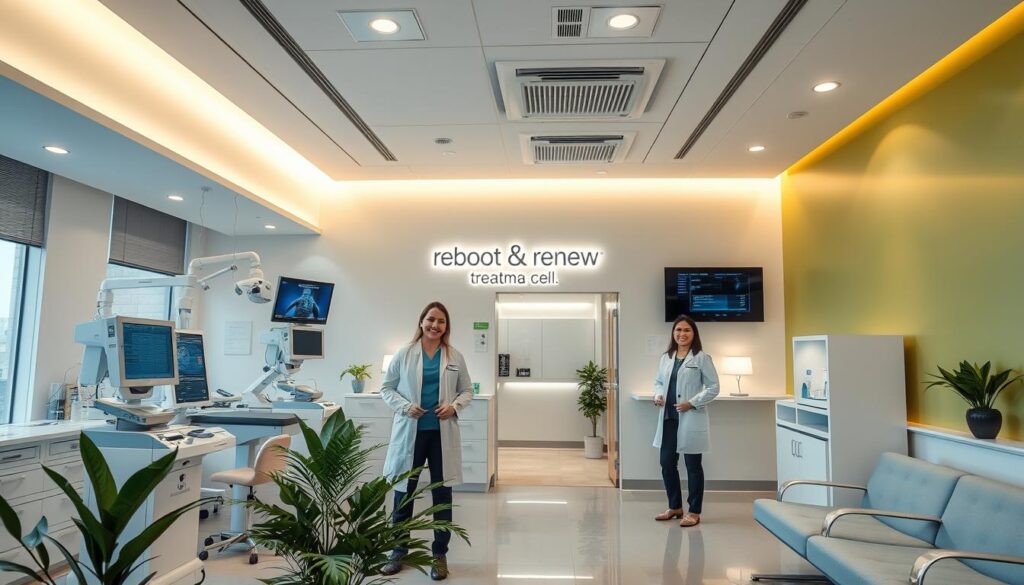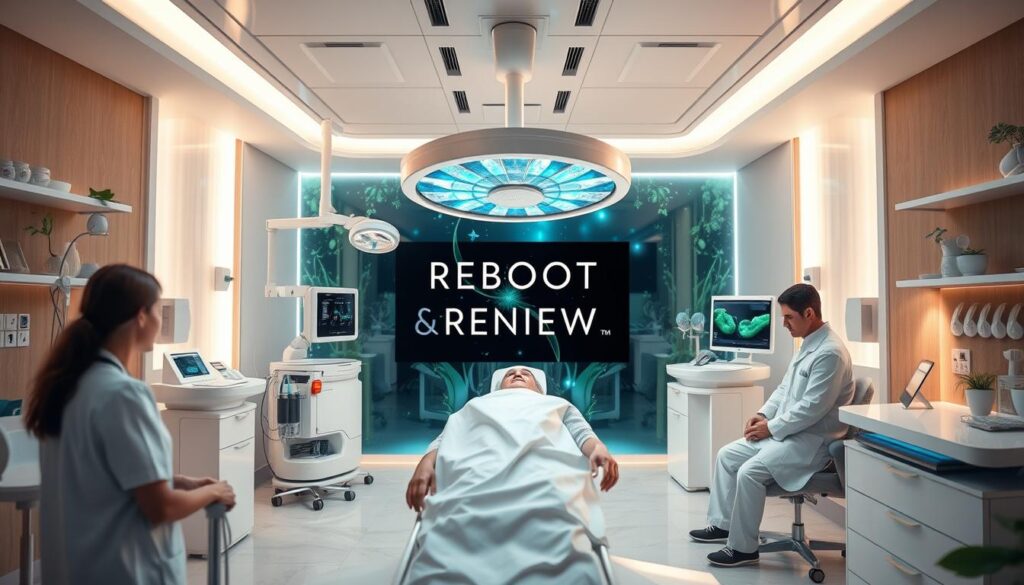Imagine using your body’s healing power with stem cells. This is a big deal in health and regeneration. Stem cells are changing health care. And there’s a new tech that boosts your body’s stem cells! It’s a top choice for health, and it’s easy to get to. Keep an eye out for this!
Finding the best stem cell clinics for Alzheimer’s means looking at their safety, treatment success, and care for patients. With Alzheimer’s affecting over 55 million people a year, and that number set to rise, picking a good clinic is key. These clinics offer top treatments for Alzheimer’s.
TruStem Cell Therapy™ is a leader, focusing on safety and using doctors with special training. They use stem cells from your own bone marrow and make them work better with special methods1. Even though the FDA hasn’t approved it yet, early results show it could slow down Alzheimer’s and ease symptoms1.
Swiss Medica and DVC Stem are also at the forefront, with a focus on caring for each patient and strong treatment plans. Swiss Medica uses a full approach, including tests, diet changes, stem cell therapy, and counseling2. DVC Stem is known worldwide for its detailed care process, which leads to better results. These clinics offer new hope for those looking for the best Alzheimer’s care.
Key Takeaways
- TruStem Cell Therapy™ uses your own bone marrow stem cells for Alzheimer’s treatment.
- About 100cc’s of bone marrow is taken out with a small surgery1.
- This therapy tries to stop brain cells from getting worse, which could slow down symptoms2.
- Swiss Medica mixes stem cell treatment with other therapies for a full approach2.
- DVC Stem’s detailed care plans lead to high success rates and worldwide respect2.
The Wellness Stem Cell Technology Company leads in wellness innovation, offering products that boost your life quality with the latest tech, like stem cell activation. These products help your body heal naturally, improving your health. To learn more about stem cell tech and its benefits, check out this link to see how it can better your health and life.
Understanding Alzheimer’s Disease and Its Symptoms
Alzheimer’s disease is a progressive disorder that affects the brain. It causes cognitive decline, changes in behavior, and psychological effects. These changes can greatly impact the lives of patients and their families.
Cognitive Decline
One of the main symptoms of Alzheimer’s is a big drop in cognitive abilities. People may forget things, have trouble understanding information, and make poor judgments. In the U.S., about 4 million people have Alzheimer’s, and this number could jump to 8.2 million by 20503.
At first, people may find everyday tasks hard, like following a recipe or handling money. As the disease gets worse, they might forget their loved ones. This shows why finding effective treatments is so important.
Behavioral Symptoms
Alzheimer’s can also cause agitation, aggression, and wandering. People may repeat actions or become suspicious of others. These behaviors are hard for both the person with Alzheimer’s and their caregivers.
Doctors in stem cell treatment clinics need to know how to handle these complex symptoms.
Mood and Psychological Symptoms
Alzheimer’s can lead to depression, anxiety, and paranoia. These mood changes can start early and can change quickly. They cause a lot of stress for patients and their families.
It’s important to spot these signs early to help manage the disease.
Alzheimer’s is the sixth leading cause of death in the U.S. Every 65 seconds, someone new gets the disease3. This shows how big of a problem Alzheimer’s is. It’s why new treatments like stem cell therapy are so important3.
Traditional Treatments for Alzheimer’s Disease
Traditional treatments for Alzheimer’s disease are key in reducing symptoms and improving life quality. They include medications, therapies, and lifestyle changes suited for each patient.
Medications
Medications for Alzheimer’s help ease symptoms, slow the disease, and treat conditions like depression and anxiety. Cholinesterase inhibitors and memantine boost neurotransmitters to help brain functions. Yet, these drugs don’t stop the disease from getting worse, showing the need for more research4.
Therapies
Non-drug therapies for Alzheimer’s are vital too. They focus on keeping the brain active, supporting emotions, and keeping the body healthy. Techniques like cognitive behavioral therapy, reminiscence therapy, and exercise help the brain and mood. A study on mice showed cell transplantation could reduce harmful brain plaques, hinting at future human benefits5.
Lifestyle Changes
Changing how we live can also help fight Alzheimer’s. Eating well, staying social, and managing health issues like high blood pressure and diabetes are key. Studies show that these lifestyle changes can slow down the disease’s effects, offering hope6.
Traditional treatments for Alzheimer’s show how complex this disease is. Medications, therapies, and lifestyle changes are crucial. But, we need more research for better treatments. Looking into safer ways to transplant cells could also improve therapy5.
Innovative Approaches: Stem Cell Therapy
Stem cell therapy is a new way to treat Alzheimer’s disease. It aims to ease symptoms and slow the disease’s progress. Research has shown it could help repair brain cells and improve thinking skills.
A 2020 study by Liu XY, Yang LP, and Zhao L looked into stem cell therapy for Alzheimer’s. They found it could be very effective7. Mesenchymal stem cells, for example, might help grow new brain cells and improve thinking in people with Alzheimer’s8. This therapy is exciting because it could change how we treat Alzheimer’s.
Stem cell therapy is important because it targets aging and Alzheimer’s link. Research in 2020 by Zhang FQ, Jiang JL, and others showed it could lead to new treatments for Alzheimer’s7. This could be a big step forward in treating the disease.
Studies by Tobin et al. in 2019 found that neural stem cells can stay in the aging brain8. This means stem cells could help repair the brain in Alzheimer’s patients. It’s a chance to use the body’s own healing powers to fight the disease.
Clinical trials are testing stem cell therapy’s safety and effectiveness. For example, using human neural progenitor cells in surgeries has shown good results over time7. These trials are important for developing new treatments for Alzheimer’s.
Kim J, Lee Y, and others in 2020 looked into mesenchymal stem cell therapy for Alzheimer’s7. They found it has a lot of potential. Studies by Macdonald R, Barnes K, Hastings C, and Mortiboys H in 2018 also explored how targeting mitochondria could help with Alzheimer’s7.
To learn more about stem cell technology and its benefits, visit the regenerative therapy page. There, you can discover how these advances could improve your health and life quality.
How Does Stem Cell Therapy for Alzheimer’s Work?
Stem cell therapy for Alzheimer’s uses stem cells in Alzheimer’s treatment to fight the disease at its roots. It aims to fix and grow back damaged brain cells. This gives hope to many patients and their families.
Types of Stem Cells Used
The stem cell therapy process for Alzheimer’s focuses on certain stem cells. Mainly, mesenchymal stem cells (MSCs) from bone marrow or umbilical cord tissue are used. These cells are great at fixing and regrowing tissues9. Research at the University of California San Diego showed that using stem cells helped improve Alzheimer’s symptoms in mice9.
Method of Administration
How stem cells are given to patients is key in the Alzheimer’s disease stem cell protocol. They are usually given through IV or in the nose. This way, they can easily get to the brain and start healing10. Studies have shown that these methods are safe and help keep the mind sharp10.
Expected Improvements
People getting stem cell therapy for Alzheimer’s can see many benefits. They might notice better memory, thinking skills, and less Alzheimer’s damage10. In tests, mice got better memory, less brain swelling, and less Alzheimer’s plaque9. Also, clinical trials found that stem cells can improve important brain markers, making Alzheimer’s treatment more effective10.
Key Benefits of Alzheimer’s Stem Cell Treatment
Alzheimer’s stem cell treatment brings many benefits to patients’ lives. It helps improve thinking skills, supports the growth of new brain cells, and helps patients recover. This treatment gives hope to those with Alzheimer’s disease.
Enhanced Memory Function
Stem cell therapy for Alzheimer’s helps improve memory. Studies show it stops Alzheimer’s from getting worse in 75% of patients, making their thinking better11. Researchers believe stem cells can help fix memory loss and improve thinking, which is a big step forward in treating Alzheimer’s.
Neuronal Regeneration
Stem cell treatment also helps grow new brain cells. This is key for better brain health and thinking skills in Alzheimer’s patients11. By using stem cells, doctors can help with symptoms, support brain health, and improve thinking12.
Overall Functional Recovery
Stem cell therapy helps patients recover fully after Alzheimer’s treatment. In 90% of cases, it made patients feel better, showing it’s effective11. By helping brain cells grow and improve thinking, stem cells help patients get back lost abilities and live better lives.
What to Look for in a Stem Cell Treatment Clinic

Choosing the right stem cell treatment clinic for Alzheimer’s disease is important. Look for accreditation, check the staff’s experience, and make sure they follow strict safety rules. These steps are key to getting top-notch Alzheimer’s therapy.
Accreditation and Certification
Make sure the clinic is accredited and certified by health authorities. Accreditation means the clinic follows strict rules for the best patient care. In 2009, the National Institutes of Health set ethical guidelines for stem cell research13. This ensures clinics work within the law and aim for excellence in Alzheimer’s therapy.
Experienced Medical Staff
It’s crucial to have a team of experts in Alzheimer’s and regenerative medicine. The skills of the medical staff greatly affect how safe and effective stem cell treatment is. Studies show that using stem cells to model Alzheimer’s can work well with skilled professionals14. These experts make sure the treatment is done right.
Quality Control and Safety Protocols
Quality control and safety in stem cell treatment are very important. This means doing safety checks, following strict procedures, and watching for any problems. Clinics like TruStem and DVC Stem follow these strict rules and have skilled teams1413. They use safe ways to get and process stem cells, like from umbilical cord blood or amniotic fluid, which can help with regenerative medicine13. This careful approach builds trust and shows the clinic is reliable for safe stem cell treatments.
TruStem Cell Therapy™: A Closer Look
TruStem Cell Therapy™ is a leading way to treat chronic diseases like Alzheimer’s with personalized stem cells. It uses new ways to get stem cells and a special treatment process. This aims to improve patient outcomes.
Unique Treatment Process
The therapy starts with a simple procedure to get bone marrow stem cells. This ensures the best stem cells are used for treatment. Then, the cells are cleaned and made more effective before being given to the patient.
Harvesting and Processing Stem Cells
Getting stem cells right is key to therapy success. TruStem Cell Therapy™ focuses on precise harvesting and processing. They use advanced methods to get the stem cells from bone marrow and make them work better. This helps the body heal naturally.
Administration Methods
TruStem Cell Therapy™ uses different ways to give cells to the body. Cells go through the nose and veins to reach the brain and nervous system. This method helps treat patients with Alzheimer’s, Parkinson’s, and Multiple Sclerosis15. Patients have seen big improvements, showing stem cell therapy’s promise15.
DVC Stem (Cayman Islands): Pioneering Alzheimer’s Treatment

DVC Stem in the Cayman Islands is a leader in Alzheimer’s treatments. They use a unique approach with mesenchymal stem cells (MSCs) given through veins. This method has shown an 85% success rate, improving memory and quality of life for patients16.
Protocol and Procedures
The treatment at DVC Stem uses MSCs from ethical sources for vein infusions. It aims to stop Alzheimer’s disease from getting worse and boost brain function. The treatment is non-invasive, making it a good choice for many.
Patient Onboarding and Success Rate
At DVC Stem, patients go through a detailed process that focuses on their needs. From the first meeting to after the treatment, they make sure everything is done right. This approach has led to a high success rate, with patients seeing big improvements in their lives16.
Global Recognition and Location Benefits
The Cayman Islands location of DVC Stem adds a calming effect that helps with recovery. This peaceful place has made DVC Stem a top spot for stem cell therapy worldwide. It combines great medical care with a beautiful Caribbean setting.
Learn more about stem cell therapy at stem cells. DVC Stem is at the forefront of finding new ways to fight Alzheimer’s disease, making a big impact globally.
Swiss Medica ХХI Century Clinic Overview
Swiss Medica XXI Century Clinic is a top choice for stem cell therapies for Alzheimer’s patients. They use cutting-edge stem cell methods and focus on each patient’s needs. This approach has led to amazing results for their clients.
Personalized Care and Treatment Plans
The clinic is known for its Swiss Medica tailored Alzheimer’s care. They create custom treatment plans for each patient. These plans combine stromal vascular fraction, autologous platelet concentrate, and fibroblasts. They also use products from umbilical cord tissue and placenta for a full therapy17.
Their treatments aim to fix organ function, boost immunity, and help mitochondria work better. This leads to better treatment results and long-term benefits17.
Advantages of Their Stem Cell Therapy
The benefits of Swiss Medica stem therapy are many. They use advanced stem cell methods to increase acetylcholine levels and help brain cells grow back. This is key for treating dementia18.
They also make sure treatments are safe, with only a small chance of side effects like fever or temporary weakness18. This shows their focus on safety and caring for patients.
Swiss Medica also uses IMR therapy to boost cell metabolism and improve mitochondria function. This speeds up recovery and extends the benefits of treatment17.
Success Stories and Patient Testimonials
Swiss Medica has many successful Alzheimer’s stem cell therapy stories from patients. These stories show how the clinic’s treatments have changed lives. Patients are very happy with the results, seeing big improvements in their thinking and physical abilities17.
The clinic is open and proud of their work, sharing over 130 video reviews on their Youtube channel. These videos show real people’s success stories17. This feedback proves their treatments work well and gives hope to those fighting Alzheimer’s disease.
Assessing Risks and Side Effects
It’s crucial to understand the risks of Alzheimer’s therapy and how safe stem cell treatments are. We must look at the possible side effects, like pain at the injection site, infections, headaches, or feeling tired.
Only about 20% of Alzheimer’s patients get help from approved drugs. More than 60% of these patients don’t stick to their treatment because of side effects19. Alzheimer’s is a progressive disease, leading to death in 5-12 years19. So, it’s vital to assess the risks to help patients and caregivers understand what to expect.
A study at the University of California San Diego found that mice given healthy stem cells kept their memory and thinking skills20. They had less inflammation and less β-amyloid, a protein linked to Alzheimer’s. But, stem cells from Alzheimer’s mice didn’t help, showing the importance of the stem cell source20.
Watching for side effects of stem cell treatments is crucial. The FDA requires strict safety standards for clinics. Only five drugs are FDA-approved for Alzheimer’s, showing the careful approach to new treatments like stem cells19. A thorough safety check and clear info on risks help patients make good choices.
Studies show stem cell therapy’s potential and challenges. For example, it helped create healthy cells in Alzheimer’s mice brains, improving their health and fighting the disease20. This result highlights the need for more research to make stem cells safe for humans19.
The Wellness Stem Cell Technology Company leads in wellness innovation, offering products that boost life quality with advanced tech, including stem cell activation. These products help the body heal naturally, supporting overall health. Visit here to learn how stem cell technology can better your health and life.
The growth of disease modeling, drug screening, and cell therapy with stem cells could change how we treat Alzheimer’s19. Good communication and risk assessment are key to making sure treatments are safe and work well, guiding patients through new medical treatments.
Conclusion
Looking at the latest in Alzheimer’s treatments, stem cell therapy stands out as a game-changer. Alzheimer’s is a big problem for older people21. Traditional treatments often don’t help much with thinking skills, making new solutions a must21. Stem cell therapy brings hope, aiming to improve brain function and lessen inflammation21.
When thinking about stem cell therapy, picking a good clinic is key. Places like TruStem Cell Therapy™ and DVC Stem in the Cayman Islands are top choices. They focus on being accredited, having skilled doctors, and strict quality checks. By picking wisely, patients can get the most out of stem cell therapy and stay safe.
The future of treating Alzheimer’s looks bright with ongoing research and trials. The Wellness Stem Cell Technology Company is leading the way with new tech, like stem cell activation, for better health and life quality. To learn more, check out their website. As research grows, there’s hope for better care and outcomes for Alzheimer’s patients.
For a detailed look at the science behind these treatments, see the recent article. It goes deep into stem cell therapy and what’s next21.
FAQ
What should I look for in the best stem cell treatment clinics for Alzheimer’s?
When looking for top stem cell clinics for Alzheimer’s, check their accreditations. Make sure the medical team has lots of experience. Also, look at their safety protocols. TruStem Cell Therapy™ and DVC Stem are great examples of clinics with high standards and quality care.
What are some common symptoms of Alzheimer’s disease?
Alzheimer’s disease shows up with cognitive decline, changes in behavior, and mood swings. Symptoms include confusion, forgetfulness, hallucinations, mood swings, and severe memory loss that makes daily tasks hard.
What are traditional treatment options for Alzheimer’s?
Traditional treatments for Alzheimer’s include medicines to manage symptoms, therapies for cognitive functions, and lifestyle changes. These help but don’t stop the disease from getting worse.
How does stem cell therapy work for Alzheimer’s disease?
Stem cell therapy for Alzheimer’s uses mesenchymal stem cells from bone marrow or umbilical cord tissue. These cells are given through IV infusions or through the nose to reach the brain. They might help improve thinking skills and lessen Alzheimer’s effects.
What are the key benefits of Alzheimer’s stem cell treatment?
Alzheimer’s stem cell treatment can boost cognitive skills, help grow new neurons, and improve brain function. It can also help stabilize memory and lessen Alzheimer’s symptoms.
What makes TruStem Cell Therapy™ unique?
TruStem Cell Therapy™ has a special way of isolating and activating cells. They use a less invasive way to get bone marrow cells. Then, they use different ways to give cells to the brain, like through the nose or veins.
What distinguishes DVC Stem’s approach to Alzheimer’s treatment?
DVC Stem is known for its unique IV infusion method using MSCs from ethical sources. This method has an 85% success rate. The clinic is known for its full care for patients and its peaceful Caribbean setting.
Why is Swiss Medica ХХI Century Clinic noted for Alzheimer’s treatment?
Swiss Medica ХХI Century Clinic is known for its custom treatment plans focused on regrowing and improving brain function. Their stem cell therapies have shown great results, as seen in patient stories and reviews.
What are the potential side effects and risks of stem cell therapy for Alzheimer’s?
Stem cell therapy is usually safe, but it can cause some side effects. These might include pain at the injection site, infections, or headaches. Good clinics follow strict safety rules and tell patients about these risks.
Source Links
- Alzheimer’s Disease – Top U.S. Stem Cell Therapy & Treatment Center
- Alzheimer’s Disease Treatment with Stem Cells Therapy | Swiss Medica
- Alzheimer’s Disease Research at NYSCF
- Researchers find success with stem cell therapy in mice model of Alzheimer’s disease
- Cell therapy for Alzheimer’s
- Stem cell therapy for Alzheimer’s disease
- Neural Stem Cells in the Treatment of Alzheimer’s Disease: Current Status, Challenges, and Future Prospects
- Stem Cell-based Therapeutic and Diagnostic Approaches in Alzheimer’s Disease
- Stem Cell Therapy Rescues Symptoms of Alzheimer’s Disease
- Stem Cell Therapy for Alzheimer’s
- Gencell Stem Cell Laboratory and Clinic
- Alzheimer’s Disease
- Answers to your questions about stem cell research
- Current Status and Challenges of Stem Cell Treatment for Alzheimer’s Disease
- TruStem Cell Therapy™ Patient Reviews – Top U.S. Stem Cell Therapy & Treatment Center
- Stem Cells: Parkinson’s Treatment Breakthrough (2024)
- Swiss Medica Clinic – an international network of clinics headquartered in St. Gallen, Switzerland.
- Dementia Treatment with Stem Cells | Swiss Medica
- Stem Cell Therapies in Alzheimer’s Disease: Applications for Disease Modeling
- Stem cell therapy rescues symptoms of Alzheimer’s disease
- Stem Cell Therapy for Alzheimer’s Disease: A Scoping Review for 2017–2022



